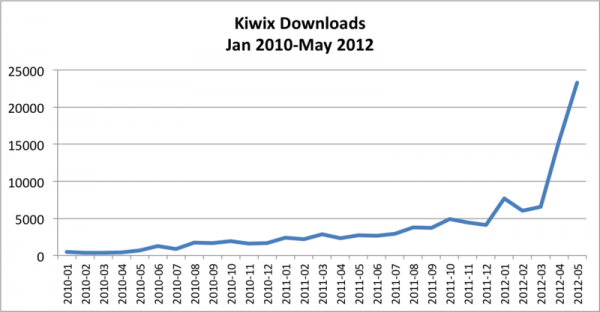Over the past several years, wikis have exerted a sizable influence on how people share and consume information online. Wikipedia, the world’s sixth-ranked Website by visitors, is perhaps the most prominent example of this sort of crowdsourcing at work: it now boasts more than 24 million articles in 285 languages, edited by an army of volunteers. But all that knowledge is only available so long as the reader is connected online.
Kiwix, an offline Wikipedia reader (and SourceForge’s 2013 Project of the Month), aims to make that data more accessible to people worldwide. Emmanuel Engelhart, one of the project developers,
recently sat down with SourceForge’s Rich Bowen to talk about Kiwix’s development and what it still needs from anyone willing to help out. Without further ado:
Bowen: Congratulations on winning the SourceForge Project of the Month for February. Engelhart: Thank you for hosting Kiwix development tools and promoting free software.
Bowen: Start by telling us what Kiwix is. How would someone use this? Engelhart: Kiwix allows [people] to read Wikipedia offline. In addition, using the highly efficient ZIM file format, Kiwix can read any HTML content offline. In order to enjoy Wikipedia offline, you need to download Kiwix and a ZIM file of Wikipedia (from
the Kiwix web-site or directly from the Kiwix internal library). Then you can surf in Wikipedia as if you were online. Kiwix provides almost everything you will need:
- Case and diacritics insensitive full text search engine
- Bookmarks & Notes
- ZIM based HTTP server
- PDF/HTML export
- Localized in more than 80 languages
- Search suggestions
- Tabs navigation
- Integrated content manager/downloader
Bowen: How did you come to start this project? Engelhart: Why lock up Wikipedia to Wikipedia.org? The contents of Wikipedia should be available for everyone! Even without Internet access. This is why we have launched the Kiwix project.
Bowen: Can you give us some examples of your project being used in the real world? Engelhart: Our users are spread all over the world: sailors on the oceans, poor students thirsty for knowledge, globetrotters almost living in planes, world’s citizens suffering from censorship or free minded prisoners. For all these people, Kiwix provides a simple and practical solution to ponder about the world. Kiwix is used, for example, by the
Wikimedia France Afripedia project, and also by
Wikimedia Kenya, and
in India. Spreading work is done by Wikimedia people and by third parties like NGOs. A lot of individuals also download Wikipedia offline once and then share it with their friends and relatives. We have had around 100,000 downloads in January. [Releasing] more and more up-to-date content is our top priority. We continuously increase our ZIM file throughput by improving our ZIM generation tool-chain. We will also soon start to release offline version of other Wikimedia projects. To make Kiwix work on smartphones is our second priority. We hope to release a first version of kiwix-mobile for Android in April. Regarding the far future, we will try to be one of the best open-source e-book readers. We think we have a cutting-edge file format with ZIM, which is perfectly complementary with the actual EPUB standard. We will do our best to offer the best user experience with both in the future.
Bowen: If someone wanted to get involved in your community, what could they do? Are you looking for developers? Translators? Users? Testers? Engelhart: Actually, the most important work to do can be done by everyone: this is promoting and sharing Wikipedia offline with Kiwix. We have remarked that most of the people, although they would really need it, think it is impossible to have the whole Wikipedia with pictures on a USB stick. That’s why we need people to set up projects and spread it. But we have also plenty of work otherwise, for example:
If you are interested, simply join us on
Freenode IRC #kiwix channel.
Image: Wikipedia 


